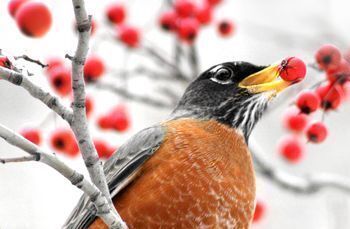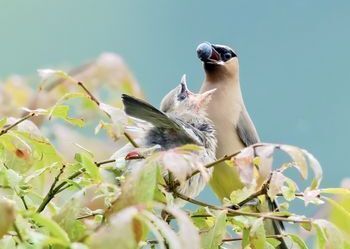Published July 10, 2022
Let's Go Birding | A Garden for the Birds
By Laura Carberry
As the days grow longer and warmer, I am increasingly eager to spend time in the garden. We all have heard about the steep decline in pollinator populations and have been encouraged to select plants that support these beneficial insects. But birds can also benefit from native plants, and I want to encourage you to also keep birds in mind when planting shrubs and flowers in your yard.
Over the last year, we heard about a mysterious disease affecting birds at feeders, and now the avian flu is causing concern. If these diseases were to spread, and experts encouraged us to take our feeders down once again, bird-friendly plants in our yards and gardens would offer plenty of natural food for birds. In the summer, most of the birds in our area are on a diet of insects, but come fall, many are looking for protein rich seeds, fruits and nuts to fuel their migrations or get them through the winter. Below are a few examples of perennials, annuals, shrubs, and trees to add to your backyard habitat.
One plant that I love is Echinacea or Purple Coneflower. This native perennial has beautiful purple flowers that attract butterflies and bees while in bloom. But come fall, the American Goldfinch loves to feed on its seeds. So, remember to leave the dead flowers still standing. Rudbeckia or Black-eyed Susan is a similar plant that attracts pollinators in bloom, but American Goldfinch, Black-capped Chickadees, and a variety of sparrows will feed on their seeds in fall.

If you love sunflowers, these make a great addition to any garden. It is like having a homemade feeder on its own stalk. If you don’t like the look of these giant dead flowers in your garden after they have passed, just snip off the head and let them dry. You can then hang the whole flower head from a tree or take the seeds off and put them in your own feeder. What a great way to be sustainable! Sunflowers come in a variety of colors and sizes. Zinnias and cosmos are also annuals that the birds love to snack on after the flowers have gone to seed. (Although these plants are not native to this area, they are not invasive and produce a nice source of seed.)

Consider planting bushes that attract birds as well. Blueberry, spicebush, and winterberry are all thoughtful additions to your yard. These attractive plants bring birds in the spring that glean the flowers looking for caterpillars. They make excellent nesting habitats, and the berries are great treats for a variety of birds in the late summer and fall. Warblers, thrushes, and Gray Catbirds are all attracted to these bushes.
And finally, don’t forget trees! There are so many varieties that attract birds. Flowering spring trees like dogwood or cherry will attract Orioles. I always find it a treat to see these bright orange and black birds visiting Fisherville in early spring. These trees provide nesting sites as well as berries to eat. Another to consider is a red cedar tree. They attract Cedar Waxwings, Eastern Bluebirds and American Robins in the winter months when food is scarce. They also make attractive screens or barriers between neighboring yards or along a road.
Enjoy the sights and sounds of spring while creating beautiful habitat for both birds and pollinators!
The Audubon Nature Shop in Bristol carries a variety of books on gardening and native plants, including “New England Bird Lovers Garden” by Randi Minetor. Shop in-person or online at asri.org/natureshop.

















